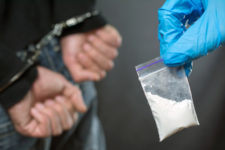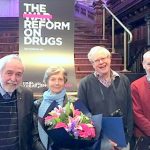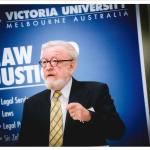Good People Break Bad Laws: Illicit Drugs

Not a lot of people who’ve grown up under drug prohibition consider that going back a little over a hundred years ago, the substances we commonly associate with being outlawed were for the most part legally available.
The first rumblings of the global prohibition of certain psychoactive substances came with the 1912 International Opium Convention. It and numerous other drug treaties eventually culminated in the 1961 UN Single Convention on Narcotic Drugs. And a decade later Nixon launched the drug war.
In June 2011, the ex-heads of state and renowned intellectuals who made up the Global Commission on Drug Policy released a report declaring “the global war on drugs has failed”. They noted it has resulted in increased drug consumption, along with “the growth of a ‘huge criminal black market’”.
With this prohibition of a select range of substances, along with the heavy-handed law enforcement response to the bans, came the criminalisation of the vast numbers of people who use drugs in the community. Indeed, this population has only grown over time.
And it’s with this understanding that harm reduction experts, civil society groups and health professionals are increasingly calling for a new way to deal with the issue of illegal drugs, with some pointing to decriminalisation, while others advocate for a legal and regulated market.
A shortage of medicine
The conservative estimate as to how many patients in Australia are using cannabis medicines is 100,000. And while the Turnbull government passed legislation to legalise the treatment in early 2016, the majority of these Australians are forced to source their medicine illegally.
As Medicinal Cannabis Users’ Association of Australia (MCUA) president Deb Lynch told Sydney Criminal Lawyers last week, the cannabis prescription system running under the auspices of the Therapeutic Goods Administration (TGA) hasn’t resulted in the majority of patients receiving scripts.
Ms Lynch relates that those who do receive legal approval to purchase cannabis medicine are at present forced to buy exorbitantly priced imported products that many simply can’t afford, while much of the small amount of locally produced medicine is being exported overseas.
However, if you speak to historian John Jiggens, he’ll tell you that prior to the 1930s “cannabis was widely used as medicine”. In fact, the most popular medicine in the British Empire was Dr J Collis Browne’s Chlorodyne, which was cannabis “dissolved in chloroform and fortified with opium”.
According to renowned medicinal cannabis advocate Dr Andrew Katelaris, many involved with cannabis medicines in this country would like a three-tier level of supply, which would allow for the legal production of homegrown whole plant medicine.
Adult use
As former Australian Greens leader Richard Di Natale pointed out in April 2018, “35 percent of Australians have tried cannabis, and the drug accounts for an ever-increasing proportion of illicit drug arrests across Australia”.
Released the month prior, the Victorian parliamentary Inquiry into Drug Law Reform report recommended investigation into the implementation of a legal system of “adult use” of cannabis, in line with developments in the US, which today, sees recreational use legalised in 11 states.
And while this never really eventuated in Victoria, it has transpired in the ACT, where the recreational use of cannabis and the possession of up to 50 grams of the plant was made legal on 31 January this year.
Which leaves people who use cannabis in NSW in the very strange situation whereby they’re still criminalised for using and possessing the herb, while just across the border – in a jurisdiction completely surrounded by this state – citizens are free to partake in a joint.
A Roy Morgan poll found last October that a growing amount of Australians – 42 percent – support the legalisation of cannabis, while the numbers opposed – 49 percent – is dropping. And it’s true that most of us know someone who’s being criminalised at this very moment because of their use.
Decriminalisation of personal possession
With the support of numerous civil society groups and lawyers’ bodies, the Uniting Church launched the Fair Treatment campaign in October 2018, calling for the decriminalisation of the possession of illegal drugs for personal use in this state.
But, while this is certainly a radical idea for NSW, the Portuguese wouldn’t even blink an eyelid, as their nation decriminalised the personal possession and use of all illicit drugs going back as far as 2001. And the sky hasn’t fallen in on them.
In Portugal, the decriminalisation of drugs has actually led to dramatic decreases in the number of drug-related deaths and HIV infections. And coupled with this is that a significant portion of the population that use drugs are no longer considered criminals.
As Australian Drug Law Reform Foundation president Dr Alex Wodak has pointed out in the past, the success of the Portuguese model doesn’t rest solely upon the removal of criminal sanctions, but it’s equally due to the significant improvement in drug treatment.
Legalisation and regulation
However, there are others who see decriminalisation as a step in the right direction, but not the final move. Prominent UK criminal barrister Chris Daw QC is one of those people. After years of seeing first hand what criminal penalties for drugs leads to, he now advocates for legalising them.
Of course, there’s the very reasonable contention that the use of illicit drugs can be problematic, and even fateful. But, harm reduction advocates argue that bringing drug use out of the shadows leads to better health outcomes and easier access to drug treatment programs.
As Mr Daw explained last July, illicit drugs “can cause serious physical and psychological harm”. But, according to the lawyer, “most of the serious harms arising from the use of drugs are caused by the law and not by the drug”.
And for those who might find the idea that drug prohibition coming to an end a hard pill to swallow, perhaps the words of the International Network of People Who Use Drugs (INPUD) executive director Judy Chang might ring true.
The drug law reform advocate remarked in May 2018 that the “war on drugs will end”. And she explained that this will come about as the “unacceptable costs” it causes become “more and more evident”.
“The arcs of history show that prohibition is not the status quo,” Ms Chang said in relation to the inevitable turning to a legalised and regulated market. “The question left unanswered is when. How much more loss and death will it take?”







